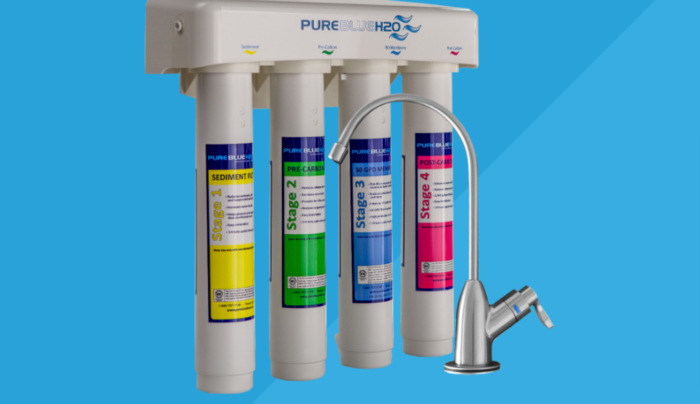What Is The Best Type Of Water Filtration System?

What Is The Best Type Of Water Filtration System?
You have many options to make an informed buying decision. Avoid buying products that are sold to you with scare tactics or alarm tactics. We recommend you do your research before purchasing to ensure you find the best high-quality water filtration system. To find out exactly what contaminants your water contains, you might consider having it tested. Public water providers are required to provide a CRC every year. Private well owners can request a water analysis from an accredited laboratory.
Common Water Filtration Systems
We can help you choose the best water filtration system for you. We believe that education is essential so we provide lots of information on our website.
These are the most popular Water Filtration System methods and systems.
Reverse Osmosis Water Filtration System
The reverse osmosis process uses water pressure to force water through a semi-permeable membrane. The dissolved substances are repelled by the membrane’s reverse osmosis surface. However, water molecules diffuse through the membrane molecule-by-molecule to form purer water. This is a popular way to reduce contaminants in water.
What Are The Contaminants a Reverse Osmosis System Can Remove?
RO Contaminant Rejection table
| Lead | 85-92% |
| Arsenic | 92-96% |
| Fluoride Pesticides Chlorine Barium Cyanide Sodium | 85-92% 97-99% 96-98% 95-98% 84-92% 84-94% |
What Is A Reverse Osmosis Water Filtration System?
Reverse osmosis water filtering is an economical and chemical-free way to improve the taste of your water. An RO system filters tap water through a semi-permeable membrane. The water is then directed to a storage tank. The RO system flushes out the impurities from the water molecules. The reverse osmosis system includes both pre and post-filters that remove additional contaminants.
What Makes My Water Taste Bad?
A POU (point-of-use) system is an excellent choice if you are looking to enhance the taste and aroma of your cooking and drinking water. Reverse Osmosis water filters are a simple, economical solution. Reverse Osmosis is able to remove lead, iron, and fluoride as well as a variety of other contaminants. An RO system can also improve the taste and quality of your water by eliminating chlorine and other unpleasant tastes.
If you choose to treat your entire house, a system is installed at the point of entry to the home POE. This allows you to first identify the cause (have a water analysis performed). After identifying the problem, you can research which water treatment equipment will best suit your needs.
What is the health Impact Of Chlorine From My Water?
Research has shown that chlorine can cause cancer by reacting with organic materials such as leaves and humus. The best and most economical way to Remove Chlorine From Drinking Water is to install a reverse-osmosis water system.
Filtration
Filtration is a process where water passes through a water system. This water system may have one or more filters to remove turbidity or taste. You can use either cartridge devices or loose media tanks. The process can include neutralizing, neutralizing, and mechanical filters.
What’s a Water Filtration System?
Water passes through a water system. It may contain one or more filters to remove turbidity or taste, color, iron, odor, and some chemicals like chlorine. You can choose to use cartridge devices or loose media tanks. The process can include neutralizing, neutralizing, and mechanical filters.
Does Water Filtration System Need Maintenance?
All water treatment equipment requires periodic attention. Many require RO replacement filters and membranes sleeves and annual cleaning. Follow the manufacturer’s maintenance and service instructions.
What Are Sediment Filters?
Sediment filters are essential for well water applications. However, they are also useful for municipal water users. A sediment filter is a barrier to prevent grit or particulates from clogging your water filter system. This can cause problems for household plumbing and decrease the life expectancy of water-using appliances.
Distillation
The process of distilling is when a liquid, such as water, is heated to make it vapor. Once the vapor has been condensed, it can be cooled and collected. It’s the process of removing liquid (water), from its constituents and contaminants. This is in contrast to other processes that remove contaminants from water (liquid). Distilled water can be defined as water that has been purified through one or more condensation cycles. It contains virtually no dissolved solids. We do not recommend or sell distillation products. Distillation is a very energy-intensive process.
What’s Distilled Water?
Distilled water is water that has been purified by passing through one or more evaporation-condensation cycles, and contains essentially no dissolved solids. It usually contains less than 5.0ppm TDS.
WHY CHOOSE US?
Paragon Water System’s factories and products are certified by organizations like the NSF, WQA, IAPMO, ISO, and others. Moreover, we make sure that our products are best suited to your requirement and of fine quality.
Here are some other reasons why we are the absolute best in the business:
- Complete Design Solutions
- Product Performance and Reliability
- Full Life-Cycle Technical Support
Paragon Water System guarantees you a Reverse Osmosis system of the finest quality. You would not find a better system than what we offer, that too with full life-cycle support. Paragon Water can provide you with the right wholesale reverse osmosis systems, whether you need a whole-home water filtration system to enjoy soft water benefits or a smaller reverse osmosis system. Call us today to learn more about residential water filters and which one is best for you.
